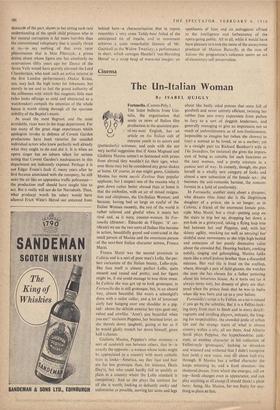Cinema
The Lin-Italian Woman
By ISABEL QUIGLY Fortunella. (Cameo-Poly.) THE latest bulletin from Uni- talia, the organisation that sends us news of Italian film production in the quaintest pen- of-my-aunt English, has an article on the Italian cult of extreme youth in its actors and (particularly) actresses; and ends with the not very tactful suggestion that if Anna Magnani and Giulietta Masina weren't so festooned with prizes from abroad they wouldn't (at their ages, what- ever those may be) be considered any great shakes at home. Of course, as one might guess, Giulietta Masina has more succes d'estime than popular applause; but I suspect one of the reasons why it goes down rather better abroad than at home is that she embodies, with an air of mixed resigna- tion and chirpiness, the Un-Italian Woman; and because, having had so large an eyeful of the Italian Woman recently, the rest of the world is rather relieved and gleeful when it meets her rival and, as it were, counter-woman. In For- tunella (director : Eduardo de Filippo; 'A' cer- tificate) we see the two sorts of Italian film heroine in action, beautifully guyed and contrasted in the small person of Masina and the enormous person of the next-best Italian character actress, Franca Marzi.
Franca Marzi was the second prostitute in Cabiria and is a sort, of poor man's Lollo, the per- fect caricature of the Italian beauty, Lollo-style. Her face itself is almost perfect Lollo, quite smooth and round and pretty; and her figure might be, if she could manage to lose three stone. In Cabiria she was got up to look grotesque; in Formitella she is still grotesque, but, in an absurd way, almost beautiful. She wears a schoolgirl's dress with a sailor collar, and a lot of luxuriant curly hair hanging over one shoulder in a pig- tail : above the skittish exterior her eyes gaze out, velvet and cowlike. 'Aren't you beautiful when you eat!' exclaims Peppino, her besotted lover, as she shovels down spaghetti, gazing at her as if he would gladly munch her down 'himself, given half a chance.
Giulietta Masina, Peppino's other mistress—a sort of sandwich one between others, that is—is exactly the opposite: a woman whose looks might be appreciated in a country with more catholic taste in looks—America, say (her face, and hair are far less grotesque than, for instance, Doris Day's), but who could hardly fail to qualify as plain in a country where the Lollo standard is compulsory. And so she plays the contrast for all she is worth, looking as defiantly cocky and unfeminine' as possible, moving her arms and legs about like badly oiled pistons that seem full of goodwill and never entirely efficient, twisting her rubber face into every expression from pathos to fury to a sort of doggish tenderness, and generally managing to give an impression not so much of unfeminineness as of non-feminineness. Impossible to imagine her (when she clowns) as (say) a woman to be loved, or as a mother; yet in a straight part (as Richard Basehart's wife in The Swindlers, for instance) she gives the impres- sion of being as suitable for such functions as the next woman, and a pretty creature in, a gamine sort of way. In comedy, though, she puts herself in a wholly new category of looks and almost a new subsection of the female sex : she becomes the anti-romantic heroine, the noncon- formist in a land of conformity.
In Fortunella, another story about a dreamer, who dreams (this time) she is the illegitimate daughter of a prince, she is no longer, as in Cahiria, a friend of the enormous female prin- ciple Miss Marzi, but a rival—putting soap on the stairs to trip her up, dropping her down a pot-hole in a graveyard, taking a flying leap into bed between her and Peppitip, and, with her skinny agility, mocking (as well as envying) her slothful stout movements as she trips high-heeled and conscious of her purely decorative value about the crowded flat. Heaving buckets, cooking noisily, singing and galumphing, Masina loOks more like a small jealous brother than a discarded mistress. Her real life is lived on the rooftop, where, through a pair of field-glasses, she watches the mah she has chosen for a father pottering about his luxurious house. As it turns out (as it always turns out), her dreams of glory are shat- tered when the prince finds that he was in India when she was born and up to a year before.
Fortunella's script is by Fellini, so a lot is missed if you go by the subtitles. But it is a Fellini-look- ing story from start to finish and in every detail : vagrants and strolling players, outcasts, the long- ing for respectability, the crowded jostle of urban life and the strange tracts of what- is almost country within a city, all are there. And Alberto Sordi plays Peppino, the hypochondriac junk- man, as another character in his collection' of Fellini-style 'grotesques,' looking so shrunken and wizened and withered that didn't recognise him (with a new voice, too) till about half-way through. If Masina has a settled character she keeps returning to, and a fixed situation—the shattered dream, from which she emerges, still on top—Sordi changes even in appearance, and can play anything at all except (I should think) a plain hero: being, like Masina, far too fruity for any- thing as plain as that.






































 Previous page
Previous page